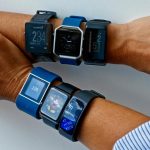 Whilst I have promoted the virtue of user-generated data in healthcare for its ability to provide a holistic overview of each patient and give doctors an early warning sign of any difficulties, for many doctors they are reluctant to go down that path because they fear the deluge of data they’ll be presented with.
Whilst I have promoted the virtue of user-generated data in healthcare for its ability to provide a holistic overview of each patient and give doctors an early warning sign of any difficulties, for many doctors they are reluctant to go down that path because they fear the deluge of data they’ll be presented with.
A recent study from Queensland University of Technology set to examine whether the data generated by wearable devices was practically useful, or merely a lot of useless noise.
“Despite the fact that we live in an era of ‘big data,’ we know surprisingly little about the suitability or effectiveness of these devices,” the authors say. “Only five percent of these devices have been formally validated.”
Under the microscope
The team analyzed data from a range of devices that are used regularly by people every day as they go about their physical and mental activities. The devices ranged from those designed to support athletic performance to those supporting general health and wellbeing. The devices fall broadly into six categories:
- devices for monitoring hydration status and metabolism
- devices, garments and mobile applications for monitoring physical and psychological stress
- wearable devices that provide physical biofeedback (e.g., muscle stimulation, haptic feedback)
- devices that provide cognitive feedback and training
- devices and applications for monitoring and promoting sleep
- devices and applications for evaluating concussion
The researchers were looking specifically at things such as core functionality, independent validation, reliability and availability on the marketplace.
As we might expect, the devices that were developed with research in mind tend to be more reliable and credible than those developed purely for the commercial market.
A healthy attachment
“What is critical to understand here is that while most of these technologies are not labeled as ‘medical devices’ per se, their very existence, let alone the accompanying marketing, conveys a sensibility that they can be used to measure a standard of health,” the researchers say. “There are ethical issues with this assumption that need to be addressed.”
For instance, they raise the prospect of users increasingly self-diagnosing their health based upon the data they gather, and the risk of this deviating from the clinical analyses performed by professionals. The limitations of the technology are often not marketed by the vendors nor understood by the users.
There were particular concerns raised about devices that aim to confirm whether someone has either sustained concussion or recovered from it, whether in a sporting or other context. The authors are very concerned that such devices may convince people that they don’t need to see a trained professional, which could be very dangerous.
They go on to say that it’s vital to understand whether the wearable devices have a significant impact on the user’s knowledge and attitude toward their health. Whilst they fully accept that healthy usage can have a tremendously positive impact, there are downsides that need to be appreciated.
“What we do know is that we need to start studying these devices and the trends they are creating,” they say. “This is a booming industry.”